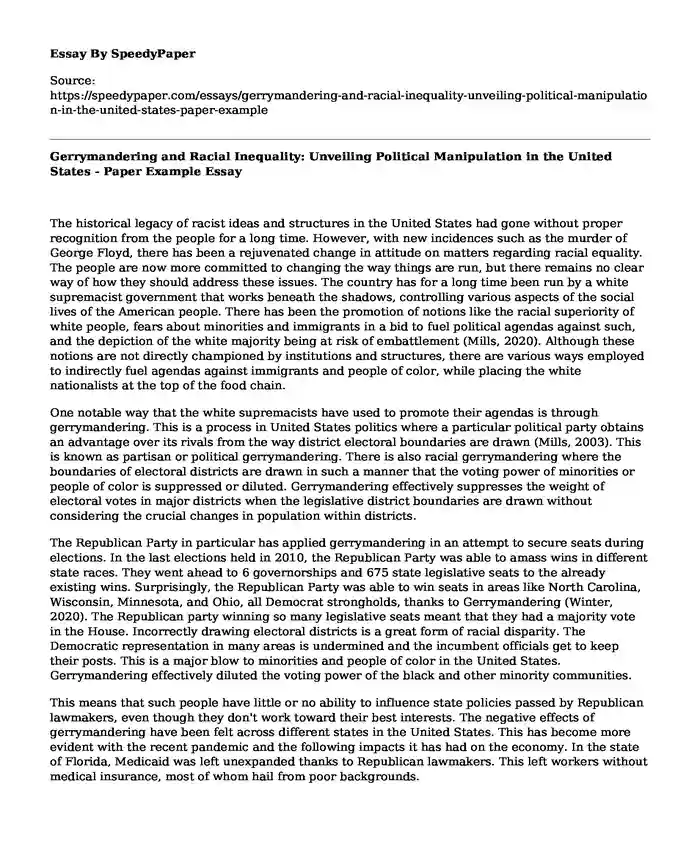The historical legacy of racist ideas and structures in the United States had gone without proper recognition from the people for a long time. However, with new incidences such as the murder of George Floyd, there has been a rejuvenated change in attitude on matters regarding racial equality. The people are now more committed to changing the way things are run, but there remains no clear way of how they should address these issues. The country has for a long time been run by a white supremacist government that works beneath the shadows, controlling various aspects of the social lives of the American people. There has been the promotion of notions like the racial superiority of white people, fears about minorities and immigrants in a bid to fuel political agendas against such, and the depiction of the white majority being at risk of embattlement (Mills, 2020). Although these notions are not directly championed by institutions and structures, there are various ways employed to indirectly fuel agendas against immigrants and people of color, while placing the white nationalists at the top of the food chain.
One notable way that the white supremacists have used to promote their agendas is through gerrymandering. This is a process in United States politics where a particular political party obtains an advantage over its rivals from the way district electoral boundaries are drawn (Mills, 2003). This is known as partisan or political gerrymandering. There is also racial gerrymandering where the boundaries of electoral districts are drawn in such a manner that the voting power of minorities or people of color is suppressed or diluted. Gerrymandering effectively suppresses the weight of electoral votes in major districts when the legislative district boundaries are drawn without considering the crucial changes in population within districts.
The Republican Party in particular has applied gerrymandering in an attempt to secure seats during elections. In the last elections held in 2010, the Republican Party was able to amass wins in different state races. They went ahead to 6 governorships and 675 state legislative seats to the already existing wins. Surprisingly, the Republican Party was able to win seats in areas like North Carolina, Wisconsin, Minnesota, and Ohio, all Democrat strongholds, thanks to Gerrymandering (Winter, 2020). The Republican party winning so many legislative seats meant that they had a majority vote in the House. Incorrectly drawing electoral districts is a great form of racial disparity. The Democratic representation in many areas is undermined and the incumbent officials get to keep their posts. This is a major blow to minorities and people of color in the United States. Gerrymandering effectively diluted the voting power of the black and other minority communities.
This means that such people have little or no ability to influence state policies passed by Republican lawmakers, even though they don't work toward their best interests. The negative effects of gerrymandering have been felt across different states in the United States. This has become more evident with the recent pandemic and the following impacts it has had on the economy. In the state of Florida, Medicaid was left unexpanded thanks to Republican lawmakers. This left workers without medical insurance, most of whom hail from poor backgrounds.
The Republican lawmakers have also acted against the best interest of minorities and people of color. Another instance is back in 2013 when the legislators passed a law that prohibited municipalities from approving paid sick leave (Winter, 2020). This happened in Orange County where they had worn local support for an agenda that provided workers with paid sick leave. Even though they had already succeeded, the Republican legislators quickly shut them down disadvantaging the local population. The majority of those affected by this move were minorities and people of color who mostly worked in essential services, especially during this pandemic. These are good examples of how gerrymandering has been used by white supremacists to promote racial inequality and disadvantage the minority and people of color.
References
Charles W. Mills (2003). White Supremacy. Blackwell Companions to Philosophy: A Companion to African-American Philosophy. Edited by Tommy L. Lott, John P. Pittman
Meaghan Winter (2020). Want to dismantle structural racism in the US? Help fight gerrymandering. Retrieve from https://www.theguardian.com/commentisfree/2020/jun/20/defund-the-police-social-control-investment-donald-trump-protests-race-george-floyd.
Cite this page
Gerrymandering and Racial Inequality: Unveiling Political Manipulation in the United States - Paper Example. (2023, Dec 27). Retrieved from https://speedypaper.com/essays/gerrymandering-and-racial-inequality-unveiling-political-manipulation-in-the-united-states-paper-example
Request Removal
If you are the original author of this essay and no longer wish to have it published on the SpeedyPaper website, please click below to request its removal:
- Cyber Crimes Essay Sample
- An Essay Example on Gender Roles
- Free Essay: Critical Analysis of Book of Addicted to Incarceration
- Free Essay on Analysis of James Baldwin's Story on Notes of a Native Son
- Free Essay Example - Juveniles and the Court System
- Paper Example: Approaches to Crime Prevention
- Free Paper Sample: Social Astuteness
Popular categories





